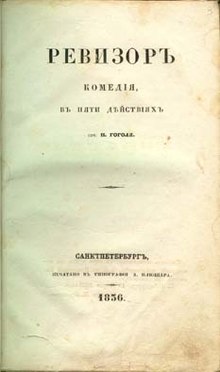The Inspector-General

Characters
edit- ANTON ANTONOVICH, Governor of a Russian provincial town.
- ANNA ANDREYEVNA, his wife.
- MARYA ANTONOVNA, his daughter.
- LUKA LUKICH, Director of Schools.
- His wife.
- AMMOS FYODOROVICH, a Judge.
- ARTEMI PHILIPPOVICH, Charity Commissioner and Warden of the Hospital.
- IVAN KUZMICH, a Postmaster.
- IVAN ALEXANDROVICH[1] KHLESTAKOV, a St. Petersburg chinovnik (official).
- OSIP, his servant.
- DOBCHINSKI, [ independent
- BOBCHINSKI, [ gentlemen.
- HUBNER, a District Doctor.
- LYULYUKOV, [
- RASTAKOVSKI, [-ex-officials.
- KAROBKIN, [
- UKHAVYORTOV, a Police Superintendent. (Chastni Prisiav, or Police-Commissary.)
- SVISTUNOV [
- PUGOVKIN [ Police-Officers. (Kvartalniye, or Ward-Inspectors)
- DERZHIMORDA [
- ABDULIN, a merchant.
- Lock-smith's Wife.
- Sergeant's Wife.
- MISHKA, servant of the Governor.
- Waiter at the inn.
- Gentlemen and ladies, guests, merchants, citizens, and petitioners.
In order to simplify for English readers the somewhat formidable cast, the surnames of the first eight characters are omitted, as they would not be used in familiar intercourse. Khlestakov's name is, however, retained in full. The surnames only of the rest, who are of lower social standing, are given. (Osip and Mishka are nicknames.) The full names of nearly all the characters occur either in the text or the notes.
THE GOVERNOR. A man who has grown old in the State service in his own opinion, a smart official. He wears an air of dignified respectability, but is by no means incorruptible. He speaks to the point, generally avoiding extremes, but sometimes launching into an argument. His features are harsh and stern, like those of a chinovnik who has worked his way up from the lowest rank. His coarse and ill-educated nature causes him to pass with rapidity from fear to joy, and from servility to arrogance. He is dressed in uniform with loops and facings, and wears Hessian boots with spurs.
ANNA ANDREYEVNA. His wife, still tolerably young, and a provincial coquette, brought up on novels and albums and household trivialities. She is very inquisitive, and displays now and then a vain disposition. Henpecks and ridicules her husband to a certain extent on minor points, when she can get the best of him in argument. Changes her dress four times in the course of the piece.
KHLESTAKOV. A young man, about twenty-three years old, mean and insignificant to look at. Not overburdened with common-sense, being, as they say, "without a tsar in his head." He would be designated as "very frivolous" in the Government offices. Speaks and acts without reflection, and lacks concentration. His style of address is abrupt, and his remarks are totally unexpected. (The actor should sustain this role with the greatest possible naivete.) Dresses in the latest fashion.
OSIP,[3] his servant, resembles other middle-aged persons of his class. Talks seriously, looks downwards, and is fond of arguing and lecturing his master. He scarcely varies the tone of his voice, addressing Khlestakov bluntly and even rudely. He is the cleverer of the two, and sees through things quicker; is silent and uncommunicative, and a rogue. Wears a rather worn-out overcoat of a grey or blue colour.
BOBCHINSKI and DOBCHINSKl are short, fat, inquisitive, and remarkably like each other. They both wear short waist- coats, and speak rapidly, with an excessive amount of gesticulation. Dobchinski is the taller and steadier, Bobchinski the more free-and-easy, of the pair.
LYAPKIN-TYAPKIN, the Judge. Has read five or six books, and so is somewhat of a freethinker. He is very fond of philosophic speculation, carefully weighing each word. (The player should be careful to preserve a judicial and consequential style.) Speaks with a bass voice and a prolonged drawl, clearing his throat beforehand, like an old-fashioned clock, which buzzes before it strikes.
ZEMLYANIKA, the Charity Commissioner, is very fat, slow, and awkward; nevertheless an intriguing rascal, most obliging and officious.
The POSTMASTER is an artless simpleton.
The other characters require no special explanation, as their prototypes can be met almost anywhere.
The company should pay especial attention to the final scene. The last word uttered must strike them like an electric shock, suddenly and simultaneously, and the whole group should fall into position at the same instant. The ladies must all ejaculate the cry of astonishment, as if it proceeded from a single throat. The neglect of these directions will ruin the whole effect.
Notes
edit- ↑ The second of the three names which Russians possess is the Otchestvo, or patronymic. It is formed by adding to the father's Christian name ovich or evich (sometimes contracted into ich) for men, and ovna or evna for women.
- ↑ By Gogol.
- ↑ Colloquial form of Yosiph "Joe."
This work is a translation and has a separate copyright status to the applicable copyright protections of the original content.
| Original: |
This work was published before January 1, 1929, and is in the public domain worldwide because the author died at least 100 years ago.
Public domainPublic domainfalsefalse |
|---|---|
| Translation: |
This work is in the public domain in the United States because it was published before January 1, 1929. This work may be in the public domain in countries and areas with longer native copyright terms that apply the rule of the shorter term to foreign works.
Public domainPublic domainfalsefalse |